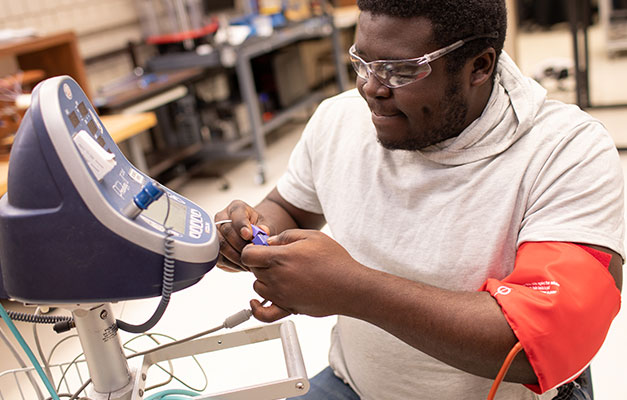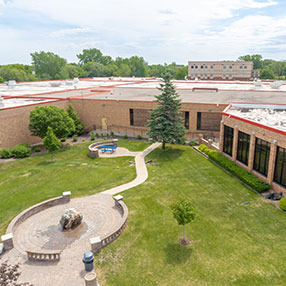Biomedical Technicians play a vital role in health care; enhancing the user experience by ensuring all medical equipment is safe and in proper working condition.
Designed by biomedical and manufacturing industry leaders, the program provides a comprehensive, hands-on, career-oriented curriculum. Students will obtain a solid education in the fundamentals of biomedical devices and industry, electronic engineering, computer and networking.

Hands-on education from industry experts

High growth rate compared to other careers in Minnesota

Curriculum designed by workforce partners
Industry & Career Outlook
Potential Jobs:
- Biomedical Electronics Technician
- Medical Equipment Repairers
- Biomedical Equipment Technician (BMET)
- Radiology Service Engineer
Salary Information:
Median Wage: $37.62 per hour
Top Earners: $49.40 per hour
Information provided is for Minnesota. See current data at mn.gov/deed.
Hear from Our Students
Other Program Info
Take a self-guided virtual tour of our campus to see what it's like to be a student at Anoka Tech. View program labs, common student spaces, campus offices and more.
Students can choose to complete any of the electronics programs part-time. Part-time students will take longer to complete their program than students who follow the full-time sequence listed on the official program guides. Because every course may not be offered each semester, it is important for part-time students to reach out to their faculty advisor for help in planning their long-term, part-time course sequence.
Below, new students can find the first semester part-time course options. After the first semester, work with your faculty advisor to plan future semesters.
Course options may differ depending on whether you plan to start in the fall or spring semester. ETEC courses for new students are not always available in the spring term. A full-time student in any electronics program would take 16 credits their first semester. Part-time students must take a minimum of 10 credits.
Important: Students who place below college-level on the ACCUPLACER tests for Arithmetic and QAS (Quantitative Reasoning, Algebra & Stats) mathematics may benefit from starting with developmental math courses before any ETEC courses.
First Semester
ETEC 1102, ETEC 1113, ETEC 1141
- These 3 courses are corequisites and therefore must be taken together.
- In addition to developmental math courses, AAS degree students starting in the spring semester also have the option of starting with general education courses if no ETEC courses are being offered.
Electronic Technology
Diploma
Robotic & Electronic Engineering Technology
AAS degree
Special Electronics Technician
AAS degree
Info for Current Students
Many of our diploma and AAS degree program have transfer agreements with four-year institutions.
Start Dates:
Fall semester: August
Spring semester: January*
*Students who start in the spring will need more time to complete due to course prerequisites.




